


Leaving the Crease
An Interview with Roy Harper
Although more widely known as the lead vocalist on Pink Floyd's "Have a Cigar", as well as the subject of the Led Zeppelin song "Hats Off To (Roy) Harper", the biography on Roy's website says this:
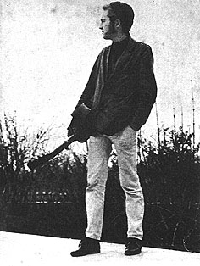 |
"In 1969 Roy undertook a short 6-venue tour with Ron Geesin and Ralph McTell. The tour program contained a great introductory paragraph: 'Roy Harper isn't an example of any category, the epitome of any movement or a rung on anybody's ladder; he built himself alone, piece by piece and his defiant character stands proud as if chiseled from belligerent granite.'"
The title of one of his early albums, Stormcock, is named after a bird who refuses to abandon his singing (courting ritual) in the face of storm force wind and rain. That description aptly fits Roy, and perhaps explains why in spite of a career that has seen him play with the likes of Pink Floyd, Keith Moon, Ian Anderson, Kate Bush, Keith Emerson, and Jimmy Page, he has indeed "built himself alone."
Over the course the past month, I've managed to have Roy find a moment between writing two books, preparing for his upcoming Autumn tour of the U.K., and living the life of a blissful newlywed, to talk about his involvement with Pink Floyd.
Spare Bricks: So how did you come to do the vocals for "Have a Cigar"?
Roy Harper: The Pink Floyd were recording at Abbey Road in 1975. So was I. I was in Studio 2 and they were in Studio 3. We were in and out of each other's sessions. I was giving myself a break from my own mixing slog on my own record, HQ. They were really struggling with "Have A Cigar". Roger had written it in a key which was above their range. The longer they sang it, the more hoarse they got trying to reach the top notes, and the more impossible it got for them to be able to record it. There was even talk about dropping it from the record.
"I'll sing it for you if you like", I said, "For a price..."
"What's the price"?, Roger said. I thought for a second or two, and I thought that I didn't really want to insult him by giving him a price in cash or royalty, rather something that I would treasure for a lifetime. I thought for a few seconds longer about what I would really enjoy having, no matter how long I lived, or which ever direction my life was to take.
What would I really like to have?, I thought. "A season ticket to Lords for life", I said. Lords cricket ground is the home of Middlesex County Cricket Club, and features all the championship finals and at least one England international match every year. I lived a walk away. It would have been the most meaningful gift for them to have given me for a valuable interpretation of Roger's view of crooked management.
"Done", he said, and we shook hands on it. All the members of The Pink Floyd were in the room at the time. Suddenly I was at work in Studio 3 as well as Studio 2! For the first day I was learning it from the inside, so to speak, and making adjustments to words and flow. The following day we recorded it. I think that Roger was relieved that he'd not had to sing it eventually. I think that it was a shot fired at the Brian Morrison school of management that he'd not actually had to fire himself.
SB: And he reneged on the deal?
RH: A cheque for a couple of hundred quid came in the post the following week. It was an insult. I let him know that he was out of order, and I never put it in the bank. It's been a bone of contention ever since. Dave has treated me well, but I hardly ever spoke with Roger after that. I sent him a few letters, and I did get one reply. It was on the corner of a piece of newspaper, and it said, 'Roy, No, Roger'. I have to admit that it's very difficult for me to understand that.
SB: How so?
RH: I wouldn't have imagined at the time that Roger could have used me in the same way as the 'Dear Boy' of the song, but that's exactly what happened. Funny the way in which former friends, and life, turns out in the end. I wish him well. To be any other way at this stage would be crass and stupid.
SB: Were the vocals done separately, or was the band playing at the same time?
RH: Separately. Roger used to be quite nervous about his work and his contact with others. He was very careful and methodical, and his humour had a cynical edge to it... I expect he's mellowed a bit these days.
SB: How did you come to know David Gilmour?
RH: I was present at a Pink Floyd gig at the Hampstead Country Club, (promoted by Stuart Lyons), which was somewhere off Haverstock Hill in Hampstead, when Syd had just gone AWOL. The band had only three members, and I can remember Roger jumping up and down on stage that night in a way that wasn't his usual thing. I think he was trying to compensate for Syd's non-appearance. It wasn't working, and in the dressing room after the gig there was talk of retirement, mainly from Roger, but the other two were in the same mood. It was a very depressing scene. I left that night thinking that I'd seen the final Pink Floyd gig. The next time I turned up to a Floyd gig, after that 'retirement', they had a new member.
I saw quite a lot of Dave in the early days. He had a retired shire horse and he played the guitar while he ate, had conversation, watched TV and fiddled with everything in sight.
SB: Some observations on the feeling in the studio at the time: Floyd had just had this hugely successful album, The Dark Side of the Moon, and were making a follow-up album which sort of paid homage to Syd Barrett ("Wish You Were Here", "Shine On You Crazy Diamond"), whilst attacking the music industry to perhaps suggest it was partially responsible for his condition ("Welcome to the Machine", "Have a Cigar"). Did you know Syd Barrett?
I met Syd a few times in the early days in places like Middle Earth. I can remember seeing female nude mud wrestling in there one night, as Floyd were playing in one room and some quite poppy band in another corner. We talked once or twice in that era. He was quiet, and I liked him. He was arty, but I guess we all had that vibe.
I met him a few years later on Oxford Street, after he'd left the band. I think we all thought that he was in a bit of trouble, and I started to try to help him, trying to make conversation. I had a car, and eventually I asked him where he was going, you know, thinking I could give him a lift. I asked him about three times... like... "Where're you going?" and he finally said, "Further than you could possibly imagine."
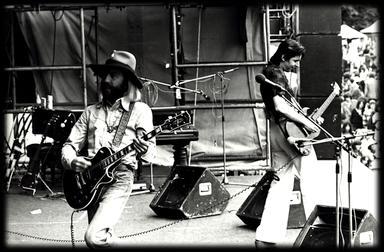 Harper, left, with guitarist Chris Spedding onstage at the 1975 Knebworth Festival. |
SB: You performed with the Floyd at Knebworth in 1975. What can you remember about that event?
RH: I smashed my dressing room (trailer) to pieces.
SB: Why?
RH: All of my gear was stolen out of the car bringing us to the gig and I had to borrow a guitar, etc. I ended up smashing my trailer to pieces, because all I saw were ideals in tatters, and no one gave a shit.
SB: Is it true that you pissed Roger off with a comment about how "they could play in front of a wall and people wouldn't know the difference", a comment which may have had a hand in the creation of The Wall?
RH: Probably, but that's not quite the story. Pete Jenner and I were mixing in Studio 4 at Abbey Road at the time, and the Floyd were in Studio 3. We got to talking about the Floyd, and how, if you were to stand cardboard cutouts on stage and play the record, it wouldn't sound any different; there would, in fact, be no difference. We were on dope, and we laughed. It got round the studios, and at evening mealtime a couple of nights later, there was a moment of silence, and Roger looked at me and said, in that sardonic tone of his, "Cardboard cutouts, eh?" and there was a bit of banter.
A few months later, during having a snooker match with him at Brit Row, which seemed to be endless, (we were at about five games apiece and we'd agreed that the one who got two frames ahead was the winner, but the game never ended), he started to play me the demos for the new ideas he had. I wanted to get on with the game, but he was insistent, and eventually I started to listen. It sounded very Roger until he said, "And then they build a wall in front of us while we're playing... blah blah... and we're then replaced by a substitute band" and I thought 'we've been here before haven't we... cardboard cutouts?
SB: Did you get on with the other members of Pink Floyd?
RH: I was the musical entertainment at Nick's first wedding somewhere in Weybridge.
SB: And Rick Wright?
RH: Rick's a gentle soul. He's quite nervous, but I always felt that he was a good guy.
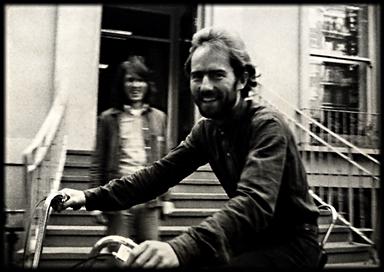 Harper, on the bicycle, with producer and one-time Pink Floyd manager Peter Jenner. |
SB: How about Peter Jenner?
RH: Pete and I would be a book. Pete's a lovely old bumbly. I think he and I share a lot of the same attitude towards life, although we express a little differently. I wish that he and I were still doing it together, but all things must pass.
SB: The theme of this issue, "Rog Against the Machine", attempts to describe how the "industry" has shaped the music and vice versa. Your career has been marked by a series of oh-so-close encounters of the big kind, only to be short-circuited by either the unwitting sabotage of your record company (in the case of Bullinamingvase) to the non-commercial aspect of many of your finest songs. Have you been "influenced" by the industry?
RH: I made about six or seven attempts, but at least five of them were non-starters, to engage the record media/business/fans. But my heart was always somewhere else. I very rarely saw anyone in musical art adopt my kind of expression. It was one of abandonment to an artistic ideal, to a point which wasn't media-driven. Bowie painted himself, and Rod had a mean vocal, but they were commerce-driven.
Now, not everything which is commerce driven is necessarily dross, but it all has a bias towards cash. Now I'm not being silly enough to suggest that the world in this state could go this way round without trade, but standing on that fine line between trading on an image and using that image to broach subject matter which isn't entirely popular is a very difficult perch to try to maintain in modern music. Very few people manage it, and even then they will only be able to maintain a moderate profile.
Pop music is a thing of tides, fashion and youth, and those three things are impossible to hold onto. I've continued to blast down my own road. I make mistakes, and an occasional error of judgement, but my dealings with the music industry are influenced mainly by how much time any of us can spend on/in each other's world. If you have something complex, fewer people will be interested in it. That's a fact of life. Most people will go no further than a tabloid headline. It's well known in the music industry that if the chorus is more than twenty-five seconds into the song, the song has very little chance of becoming a hit. This sort of thing influences me greatly. It tends to get me writing immensely long songs with no chorus.
SB: So you've never concerned yourself with what's popular or fashionable?
RH: I was always made very well aware of fashion, and I usually gave it a wide berth for the simple reason that it was usually in some way mindless media at it's worst. Usually just plain tasteless. As I progressed, the lack of mind bothered me. Not that I'm an intellectual snob of course, because you wouldn't even consider me an intellectual, but I found it increasingly difficult to identify with the general rip-off in the world. Literally, I just couldn't make the leap to being able to prostitute what I had, with, say, a band, or an embrace of a particular mode of fashion just for the Lucre.
I think that a lot of my contemporaries became disillusioned with me, or didn't trust me, or thought that I was being a complete twit, but at the time I held the view that I would hold my course, because I knew it to be a truer path for me. And it has been.
SB: But not as financially rewarding?
RH: There isn't much kudos attached to someone who is finally perceived to be an also-ran, except that I knew that at this age I'd still be up and running, because the tank which was fuelling me was emotionally bottomless. It's a way of life. And it's the way of life I chose because I loved it. I had a spectacularly unsuccessful time at the beginning of the eighties, when I didn't even have the wherewithal to record, and I didn't have any tech know how, and I had another difficult time at the beginning of the nineties when my domestic arrangement fell apart, but in the main, I've loved and lived a long life as a poet in music.

SB: Do you see a difference in how musicians have been treated over the years? For instance, between the mid 70s and now?
RH: There are a lot of basic similarities. Most young people who aspire to become performers or indeed to be involved in any way at all with the music business, are ripped off for the first few years. This would be true in the average job as well, if there now weren't general laws to protect workers rights. But in the music industry, this very often is not the case, because the glamour factor will keep people running on empty a long time after they should have seen the light and turned the mains off with the boss in the elevator over a long weekend.
SB: Has it always been this way?
RH: A good many of us thought for a brief moment in 1967 that we could escape and set up an alternative lifestyle/anti-business model, and of course a big wave of that persisted for a few years after that, but we were about as organized as average surf, and we ended up smashed on the material beach within months actually.
SB: Why?
RH: The problem with anti-establishment movements is that they have to contain huge elements of all walks of life from top to bottom, and have a will against perceived social injustice so that the John Lennons and even the Jim Morrisons stick it out on the virtual street. Fight for what's worth fighting for. But of course, once Mick Jagger or Jefferson Airplane sign the next million dollar deal with the old world, you're in disarray. And of course, at the time, all that any of us could do was to speak about our own lot, our own generation, and the young generation can never embrace the whole of society.
SB: What has been done to change this?
RH: I suppose that what we did establish in those days was that the young generation is the generation with the media power. For the simple reason that they are suddenly able to choose their own media gods. And their gods are all fresh... OK, so these gods are fed to them by a much more cynical early middle age generation, but it's the young generation who have the disposable income to club together to make their pin-ups their icons and statements.
SB: And what has your role been?
RH: People like me tried to broaden that with statements like "McGoohan's Blues", and "The Same Old Rock", but A+R and marketing would have had to have been disciples! I still think that no matter who tells me that our individual freedoms are legion compared to those 'enjoyed' by our parents; that most years we're not even trying, and some years, it goes backwards. Of course, it always looks as if it's going forwards, because of apparent 'modernization', but that's just because of some new way to wax and polish.
No. There wasn't a hope in hell, and the only reason I hung on for so long was because I did. I saw something impossible, and went for it... and I'm still going for it... a peaceful anarchy. And those two words are by no means mutually exclusive.
But I have to think that it's an increasingly impossible world in which no one is intentionally ripped off or hurt too badly. I realize that the dream of peaceful anarchy is untenable, that a sadder kind of anarchy is now gaining ground. The universal vote was achieved for whole nations of people in the nineteenth and twentieth centuries. The main reason suffrage was achieved was that the sheer weight of people in the cities began to be ungovernable, and the only way to achieve goverment, and anything like maintain the status quo, was to give those people a share in their own government.
People had ended up in the cities because of the stripping of rural labour to man industrialisation. In the 1780s the French had failed to address the problem and had been overun by their poor millions... blood flowed in the streets. The rest of the world took good notice. In Russia and China not enough notice was taken, and blood flowed again. The rest of the world didn't escape. Hitler was the result of war, and a beaten population being dissatisfied and released to their own means, which can be myopic, and get violent really quickly. Education is important. With continuing increase in populations, there is increasingly less hope of precisely controlling them. Much as governments would like to. I have many songs which concern this issue. There's a collision in there somewhere, but that's for another essay.
Suffice to say that from the point of view of how I relate to the world, I'd like to have seen entire areas of humanity taking care of their own affairs, so that no one is left out, and that the job of work every morning is right where you live. It just involves walking out of the door and taking care of things. Of course this cannot happen because as soon as one group produces more than it can eat itself, that surplus becomes the subject of sharp practice, and profit and 'economics' begin to flow, and before you know where you are again, someone's being driven around in a Rolls Royce, and others are bowing and scraping.
For a brief moment, when I was young, I thought that we may have had the chance to get away from that. With Beamers in China, we were a hundred years too late. How do I intend to persuade the Chinese to change direction? Or dissuade the kids down the block from smashing the car I came in, so that I can make another vain attempt to get to where I think I last imagined home to be?
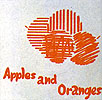 |
From "Apples and Oranges" comes the line "I'm the lorry driver man." This word 'lorry' isn't in many people's vocabulary outside of Britain. Here in the States, we call them trucks.
From "It Would Be So Nice" comes the line "Have you ever read the Daily Standard?" This was an indirect reference to the Evening Standard, since a direct reference to the newspaper's name was not allowed. But either way, what circulation did this paper have outside the U.K.?
From "Let There Be More Light" comes the line "Then at last the mighty ship descending on a point of flame made contact with the human race at Mildenhall." From Dover to Scapa Flow, my knowledge of Great Britain's geography is pretty good; but I had to break out my atlas to locate the Mildenhall Royal Air Force Base.
From "Cymbaline" comes the line "Apprehension creeping like a tube train up your spine." Like the lorry, 'tube train' just isn't in my vocabulary. 'Subway', yes. 'Tube', no.
On the album Ummagumma, we don't have look past the song titles to find local references, such as "Grantchester Meadows", an area near Cambridge, and a ranting Scottish Pict.
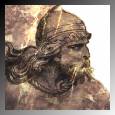 |
But the most obscure lyric of all comes from "Let There Be More Light"--"The living soul of Hereward the Wake." I'm familiar with King Harold, William the Conqueror, the Normans, and the Battle of Hastings in 1066; but Hereward the Wake? A quick Internet search provided details about this English folk hero who fought against the Norman invasion. But, outside England, who has covered this character in their high school history books?
These examples show that the earliest (pre-Atom Heart Mother) Pink Floyd material contains many local references. This should be ample proof for the first phase of lyrical evolution. But for the second phase, these local references should disappear, replaced with solely generic passages.
After perusing Atom Heart Mother, Meddle, Obscured By Clouds, and Dark Side of the Moon, I've failed to locate any local references. The closest attempt comes from the song "Fearless". This song contains a snippet from the Liverpool football chant, which isn't really "lyrics" in the true sense of the word.
The boys finally made the big time with The Dark Side of the Moon, and with it came the pressure to repeat. The songs "Have A Cigar" and "Welcome to the Machine" from their followup album, Wish You Were Here, would address this very issue. But I don't find any "Americanization" of the lyrics. The lyrics on Animals are also generic, save for a local reference to Mary Whitehouse and her campaign to clean up her country's morals.
But in The Wall, the lyrics begin to demonstrate American references.
From "Mother" comes the line "Mother should I run for president?" Although the United States isn't the only country whose head of state is a president, if Roger is being autobiographical, this line should have referred to Britain's Parliament or the Prime Minister.
From "One of My Turns" comes the line "Or contemplate the silent freeway?" Freeways are a common sight in California, but elsewhere?
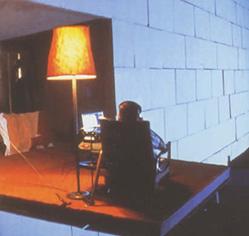 |
From "Nobody Home" comes the line "Got thirteen channels of shit on the T.V. to choose from." Ah, now that brings back memories. In the US, VHF had thirteen channels (actually it was twelve, since the first channel was channel two, but let's not get picky). In the UK... let's see, there's BBC1 and BBC2 and uh, um, ah. Were there 13 channels on British TV back in the '70s?
From "Another Brick in the Wall, part 1" comes the line "Daddy's flown across the ocean." The British often refer to the Atlantic Ocean as a "pond". But since when did the English Channel become an "ocean"? This strikes me as the most blatant attempt to appeal to an American audience.
I can only imagine if those early songs from the '60s were recorded at this time in the band's career. Would Dan Dare have been replaced by Flash Gordon? Would the Daily Standard have been replaced by the National Enquirer or New York Times? Would Mildenhall have been replaced by Roswell? Would Hereward the Wake have been replaced by Robin of the Hood?
It's quite possible. But was The Wall completely converted for American consumption? The Wall lyrics also make reference to the English singer Vera Lynn. Although very popular in her homeland, she was also very popular in the U.S. This may be considered a local reference; but there's no need to debate it when you've got "Waiting for the Worms" and its line "Would you like to see Britannia rule again?" After all the Americanization done to the lyrics in The Wall, I'm stumped as to why this line exists.
Now that global superstardom has been achieved, we find a plethora of 'international' lyrics in the band's next album: "The Nips", "the Clyde", "Maggie", "Dresden", "Brezhnev took Afghanistan, Begin took Beirut, Galtieri took the Union Jack", "McCarthy", "Nixon", "Latin-American meatpacking glitterati", "Southampton dock", "those wily Japanese", "Hollywood waits at the end of the rainbow", "the Vietnamese", "the Russian bear", "the Swedes", "Argentina".
Finally, it all comes full circle with the local flavor and very personal "High Hopes" which includes the line "Along the Long Road and on down the Causeway, do they still meet there by the Cut", referring to the band's Cambridge roots.
So in conclusion, I'd say that the mold fits, more or less. But for those still in doubt about the band's Americanization, let's have one last look.
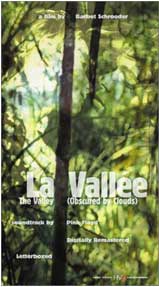 |
In 1972, the Pink Floyd did the soundtrack for a French film called La Vallee. One of the songs in the film contained the following lyrics:
Take my advice
And cut yourself a slice
And try not to make it too big
'Cause things are hard to grow
And I'm gonna tell ya, 'cause I know
It's better not to make yourself sick
Knowing that the film wouldn't get much play outside of France, when the band went back into the studio to re-record the music for a soundtrack album, they made a few changes. First was to dump any idea of using Music from La Vallee as the album's title. Second was a rewrite of the above lyrics in the song "Free Four", indicating that the band was fully aware of its course:
So all aboard for the American tour
And maybe you'll make it to the top
And mind how you go, and I can tell you, 'cause I know
You may find it hard to get off